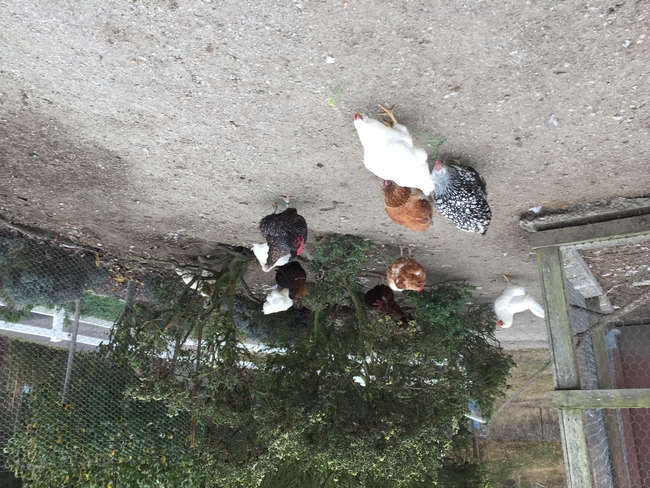
Posts Tagged: avian influenza
Bird owners urged to take precautions for avian flu
The highly contagious avian flu is being spread primarily by migratory birds, putting game birds, and backyard and commercial poultry at risk.
“Poultry owners should take precautions to prevent their birds from contacting waterfowl or the habitat that waterfowl frequent because this strain of avian influenza is highly contagious,” said Maurice Pitesky, UC Davis School of Veterinary Medicine associate professor of Cooperative Extension.
Infected waterfowl shed the highly pathogenic avian influenza virus in their feces and respiratory secretions, where the virus can remain viable for months in the environment.
“If you can't confine your birds in a coop, focus on good sanitation and reducing contact with waterfowl and their habitat such as agricultural fields and ponds,” he said.
Pitesky urges commercial and backyard chicken owners to monitor their birds for the following symptoms:
- Reduced egg production
- Trouble breathing
- Clear, runny discharge from nose, mouth and eyes
- Lethargy or lack of energy
- Loss of appetite
- Drinking less
- Swollen eyes, head, wattles or combs
- Discolored or bruised comb, wattles or legs
- Sudden death
To prevent exposure to potentially infected waterfowl, Pitesky suggests reassessing and redoubling biosecurity efforts to prevent contact between wild animals and domestic poultry.
Specifically, he recommends keeping birds away from ponds and other open water where they may contact waterfowl, which are the primary reservoir of the disease. To prevent cross-contamination, use clothing and boots that stay on your property and avoid sharing equipment with other bird owners.
A local veterinarian or UC Cooperative Extension farm advisor may have more suggestions to reduce risk.
For more information about protecting birds from avian influenza, visit https://ucanr.edu/sites/poultry/files/225352.pdf.
Unusual or suspicious sick or dead domestic birds should be reported to the California Department of Food and Agriculture Sick Bird Hotline at (866) 922-2473.
Suspicious wild bird deaths can be reported to California Department of Fish and Wildlife (CDFW) at https://wildlife.ca.gov/Conservation/Laboratories/Wildlife-Health/Monitoring/Mortality-Report.
Poultry owners urged to protect birds from avian influenza virus
A strain of highly pathogenic avian influenza is currently infecting and killing wild birds and domestic birds in at least 29 states across the United States.
A UC Agriculture and Natural Resources poultry expert urges commercial and backyard chicken owners to take precautions.
“When it comes to protecting your flock, there is no treatment for HPAI so the best thing you can do is focus on biosecurity,” said Maurice Pitesky, UC Cooperative Extension poultry specialist in the School of Veterinary Medicine at UC Davis.
“In order to protect our commercial and backyard chickens, it is essential for all of us who own poultry to do our part,” he said.
The current avian influenza outbreak is already considered the worst bird flu outbreak since the 2015 HPAI outbreak when nearly 50 million poultry were euthanized or died.
The HPAI virus is being spread by migrating birds and California is part of the Pacific migratory flyway.
“Waterfowl migrate thousands of miles between wintering and breeding locations and have long been known to be the natural reservoirs for avian influenza viruses, which are associated with high mortality in poultry,” Pitesky explained. “Many of these migrating ducks, geese and swans winter in the relatively warmer climate of California's Central Valley among other locations where they can find appropriate habitat.”
Pitesky recommends preventing chickens and other poultry from exposure to waterfowl and other potential wild bird carriers.
“At the most generic level, that means making sure your birds are separated from any wildlife,” he said. “Whether you have a million-bird farm or just a few backyard chickens, the message is the same: maintain the best biosecurity you can, which includes fencing and make sure you reduce reasons for waterfowl to come near your birds such as spilled feed and ponding of water.
“Our previous research has shown that waterfowl are attracted to both natural and human-made wetlands and lagoons. So, if you live near one of these types of habitats, your biosecurity efforts are even more important.”
The HPAI virus does not currently affect humans. Pitesky said it is important to recognize that avian influenza viruses, like all viruses, can mutate or recombine to form new versions of virus that may affect humans.
For more information on biosecurity and where HPAI has been identified in the U.S., please visit the UC Cooperative Extension poultry website at https://ucanr.edu/sites/poultry/Resources_335/HPAI.
Poultry owners who have questions may reach Pitesky at mepitesky@ucdavis.edu.



